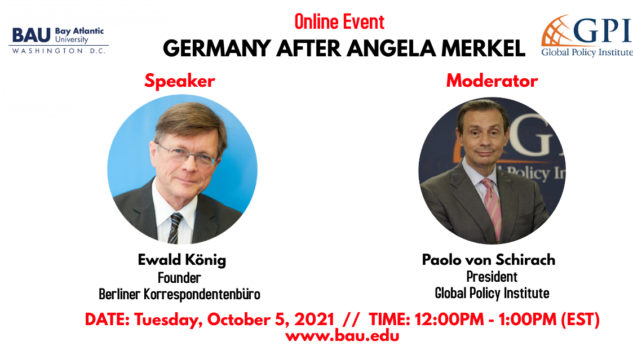Events

Event Summary // Germany After Angela Merkel
A New Chapter for Germany
On October 5 Bay Atlantic University and the Global Policy Institute held a joint webinar titled “Germany After Angela Merkel” for an in-depth conversation on Germany’s future with a renowned Berlin-based analyst and commentator Mr. Ewald König.
For 16 years former Chancellor Angela Merkel dominated German politics. After the recently held national elections, Germany now begins a new chapter. Without a clear winner, the country will be run by a coalition government. What are the pressing issues confronting Germany, the world’s fourth largest economy and Europe’s first? Will a new government in Berlin develop a new approach towards European integration, global trade and investments? And what about the future of NATO, and broader foreign and security issues, such as EU relations with China?
Speaker
Ewald König, Founder of Berliner Korrespondentenbüro
Moderator
Paolo von Schirach, President Global Policy Institute and Chair, Political Science and International relations, Bay Atlantic University
Event Summary
Konig explained the main drivers of German politics prior to the elections, focusing primarily on the dramatic loss of support for the once dominant Christian Democrats. Indeed, while now former Chancellor Angela Merkel remains popular, the party she used to lead literally tanked. Still, while with the most recent vote the Christian Democrats had the worst electoral results since the beginning of the German Republic, no clear winner emerged. The Social Democrats came first. But they lead by less than 2%, a tiny margin. The Greens did well, Koning continued, but they did not come even close to what some polls had indicated during the campaign. The Liberal Democrats had a decent but hardly inspiring day. As a result of an inconclusive election, the only way forward for Germany is a coalition government. While the pro-business Liberal Democrats would be more at ease in a coalition with the more conservative Christian Democrats, it is most unlikely that after this humiliating defeat they will be given a chance to form a new government. Therefore, Koning argued, expect a coalition featuring the Social Democrats, the Greens and the Liberal Democrats. That said, Koning cautioned, even with the Christian Democrats out of government, do not expect major changes in German politics. A new Center-Left Government in Berlin will not be markedly different from the one led by Merkel who governed as a moderate, at times almost leftist, conservative. Germany will focus on energy issues, its green agenda and the need to modernize its economy, still behind in adopting digitization. On foreign policy, expect no new departures. Germany will still be the leading EU economy and dominant member. However, most major decisions in Europe require a consensus. Almost impossible to think about bold new initiatives, when so many different members have to agree on one policy. Not much, Koning added, is to be expected on the issue of creating European defense forces, as French President Macron has strongly recommended. Likewise, do not expect Germany, and therefore the rest of the European Union, to agree with Washington on a hard line with Beijing. Germany has strong and economically significant business relations with China. They will not be sacrificed to please the United States. All in all, while Merkel is gone, the cautious, low profile, pragmatic approach that characterized her 16 years in power will likely continue.
Speaker Bio
Ewald König, Founder of Berliner Korrespondentenbüro
Ewald König (bornin Vienna, Austria) is a European correspondent and analyst based in Berlin, Germany. He is the owner of the Berliner Korrespondentenbüro -- International Media Projects, book author, moderator, TV host and commentator on foreign TV channels.
He has been a journalist for 45 years. He was the only correspondent who was accredited in both West and in East Germany and became eyewitness of the fall of the Berlin Wall. He wrote several books about this time. For five years he was chairman of the Federal Association of the Foreign Press (VAP) in Germany (500 correspondents reporting to media in 60 countries).
He was correspondent for an Austrian daily, then editor--in--chief and publisher of a pan-European online medium. Since then, he has been editor--in--chief of the Berliner Korrespondentenbüro – International Media Projects, TV moderator, commentator in foreign (mainly Arabic) TV broadcasters and organizer of the so-called correspondents’ cafe (www.korrespondenten.cafe) with German and foreign politicians.